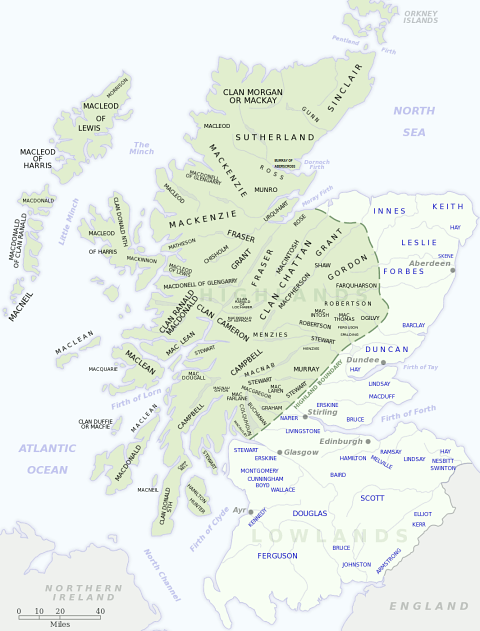
Motto: Per ardua (Through hardship or difficulty)
Historic Seat: Glennoe
District: Argyll
Associated Surnames: MacTear, Tyre, Wright
Associated Tartans:
Early MacIntyre Genealogy and History:
(Excerpt from "The Scottish Clans and Their Tartans", James Grant, 1906)
Glen O, near Bunawe, in the district of Lorne, was the country of this sept, which General Stewart says they possessed from 1300 down to 1810. They were originally the Hereditary Foresters to the Stewarts, Lords of Lorne, and were continued in their possessions and employments after the succession of the Glenorchy and Breadalbane families to that estate, by a marriage with a co-heiress of the last Lord of Lorne of the Stewart family in 1435.
Tradition says they are descended from the MacDonalds.
The name occurs in the "Eglinton Memorials," under date 1490, when "Gillechrist M'Yntyr" witnesses a "Letter of Reversion" by the Rector of the Church of St. Mary at Rothesay, and "Christino M'Yntyr" witnesses an Instrument of Sasin1 in favour of the same priest.
During Montrose's invasion of Argyll, 1644-45, Alaster MacColkeitach, with his brigade, marched through Glen O; and supposing himself to be still among the Campbells, he "ordered all the houses in Glen O to be destroyed, as their inhabitants had fled; and the dwelling of the chief, which was roofed with heather, was the first to be given to the flames. A burning of coal was brought from the hearth and thrust into the deep thatch; but before the fire had made progress, Alaster was informed that this was the house of the chief of the MacIntyres. 'Then forbear,' he exclaimed, 'and extinguish the flames, for it is the house of our own blood!'" referring to the tradition above given. "The coal was extracted from the roof, and, as a relique to prove the respect paid by a Scotsman even to traditionary ties of kindred, it was carefully preserved by the MacIntyres of that Ilk, until the last of them, with all the men of Glen O, were expatriated to America."
John MacIntyre, piper to Menzies of that Ilk, composed the salute, "Failte Phrionsa," on the landing of King James in 1715.
Duncan Ban MacIntyre, of this tribe, one of the best of modern Gaelic poets, was born of poor parents at Druimliaghart, in Glenorchy, in 1724, and fought at Falkirk2 under Colonel Campbell of Carwhin. He became a private in a Highland fencible regiment, with which he served till it was disbanded in 1799. Though he never received any education he excelled in every kind of verse. His poems have gone through three editions; and the writer of his life in Reid's "Bibliotheca Scoto-Celtica" says, "All good judges of Celtic poetry agree that nothing like the purity of his Gaelic and the style of his poetry have appeared in the Highlands since the days of Ossian." In his old age he became one of the City Guard at Edinburgh, where he died in 1812. He is buried in the Greyfriars. In 1859 a stately monument of a Druidical stylew as erected to his memory at Dalmally, near the head of Lochawe.
Another bard of the name of MacIntyre is mentioned in the Book of the Dean of Lismore.
(End excerpt)
Next page: Clan MacKay
Footnotes:
1 Sasine: In Scots law, the delivery of feudal property or land, including buildings, trees, underground minerals, etc.
2 The Battle of Falkirk Muir (1746): The Battle of Falkirk Muir was fought on 17 January 1746 between the Jacobites under Prince Charles Edward Stuart (Bonnie Prince Charlie) and a government army commanded by Lieutenant General Henry Hawley. Read more about the Battle of Falkirk Muir at Wikipedia.

Distribution of Scottish clans and families
View larger map at Wikimedia Commons

Browse the Clan MacIntyre Tartan Collection with home decor, personal accessories, crafting, paper products, and more.

Browse the Argyll District Tartan Collection with home decor, personal accessories, crafting, paper products, and more.

Clan MacIntyre Postcard: Digitally cleaned and enhanced vintage illustration with tartan border.